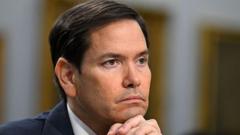As the nation commemorates the fifth anniversary of George Floyd's tragic murder, family members and community advocates are once again rallying together to honor his memory. Floyd's death, which occurred on May 25, 2020, at the hands of former Minneapolis police officer Derek Chauvin, ignited a massive wave of protests across the United States and world, prompting discussions about racism and police brutality.
Remembering George Floyd: Five Years of Change and Continuity

Remembering George Floyd: Five Years of Change and Continuity
On the fifth anniversary of George Floyd's death, Americans reflect on his legacy and the ongoing struggle against systemic racism in the U.S.
This weekend, festivities took place in both Minneapolis, where Floyd was killed, and Houston, his hometown. In Houston, the Rev. Al Sharpton led a gathering near Floyd's gravesite, where family and friends celebrated his life and legacy. Meanwhile, several events were held in Minneapolis, including a church service, a candlelight vigil, and an evening gospel concert in the globally recognized George Floyd Square. Angela Harrelson, Floyd's aunt, expressed a resolute call to action, stating, "Now is the time for the people to rise up and continue the good work we started."
Floyd's heartbreaking death served as a catalyst for a national reckoning with racial injustice, yet recent trends suggest momentum for change may be waning. As former President Donald Trump reverses reforms aimed at improving police conduct, cities like Minneapolis are caught in a tug-of-war between local commitments to reform and federal blowback. Minneapolis Mayor Jacob Frey reaffirmed the city's determination to comply with a consent decree focused on policing reform despite the new administration's critical stance on oversight measures.
Civil investigations into law enforcement agencies initiated under the Biden administration indicated systemic misconduct; however, the Trump administration recently dismissed those findings as flawed. In the wake of Floyd's passing, feelings of urgency in the fight against systemic racism seem to have softened, with recent surveys indicating that the American public perceives little progress in the lives of Black citizens. Notably, support for the Black Lives Matter movement has declined significantly since the height of protests in 2020, posing new challenges for advocates and allies.
As memorials for George Floyd continue, the message remains clear: The work towards justice and equality is ongoing, and the legacy of Floyd will serve as both a reminder and a rallying cry for those who dare to dream of a more equitable future.
Floyd's heartbreaking death served as a catalyst for a national reckoning with racial injustice, yet recent trends suggest momentum for change may be waning. As former President Donald Trump reverses reforms aimed at improving police conduct, cities like Minneapolis are caught in a tug-of-war between local commitments to reform and federal blowback. Minneapolis Mayor Jacob Frey reaffirmed the city's determination to comply with a consent decree focused on policing reform despite the new administration's critical stance on oversight measures.
Civil investigations into law enforcement agencies initiated under the Biden administration indicated systemic misconduct; however, the Trump administration recently dismissed those findings as flawed. In the wake of Floyd's passing, feelings of urgency in the fight against systemic racism seem to have softened, with recent surveys indicating that the American public perceives little progress in the lives of Black citizens. Notably, support for the Black Lives Matter movement has declined significantly since the height of protests in 2020, posing new challenges for advocates and allies.
As memorials for George Floyd continue, the message remains clear: The work towards justice and equality is ongoing, and the legacy of Floyd will serve as both a reminder and a rallying cry for those who dare to dream of a more equitable future.






















